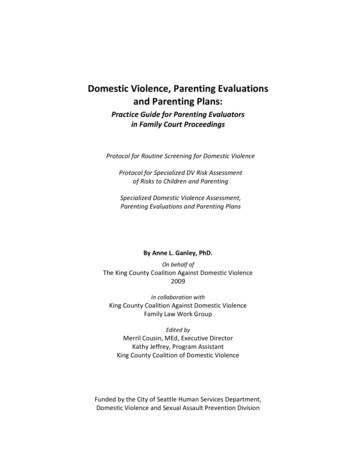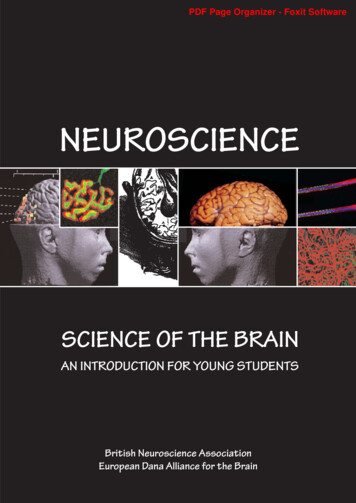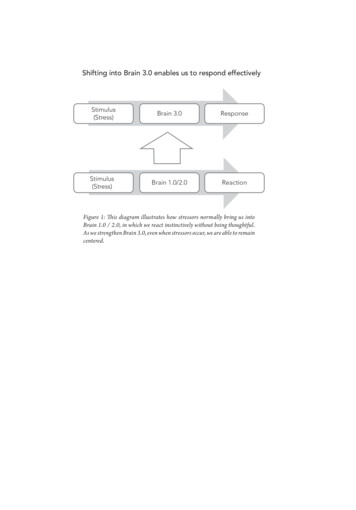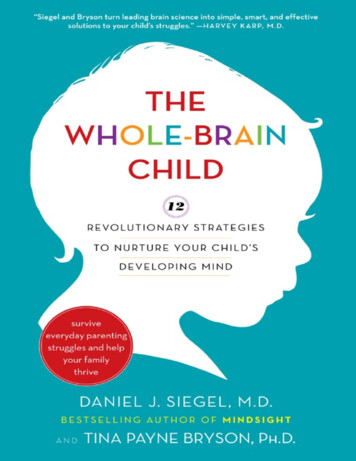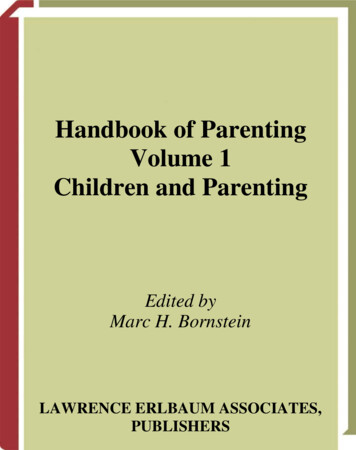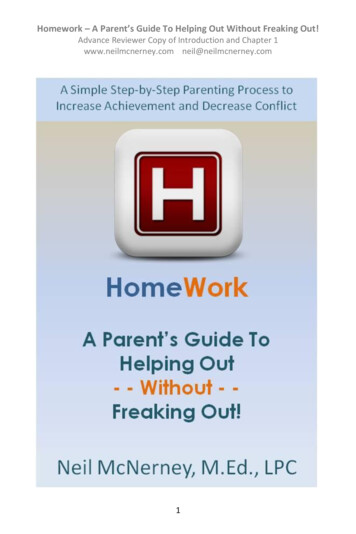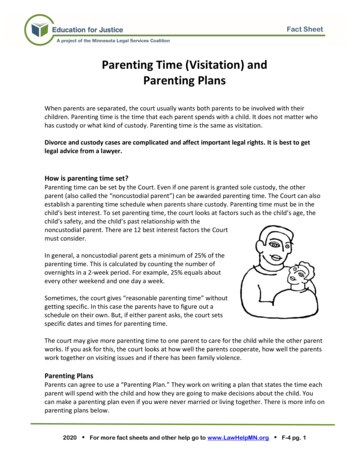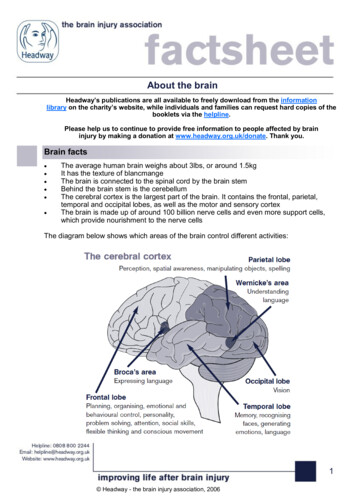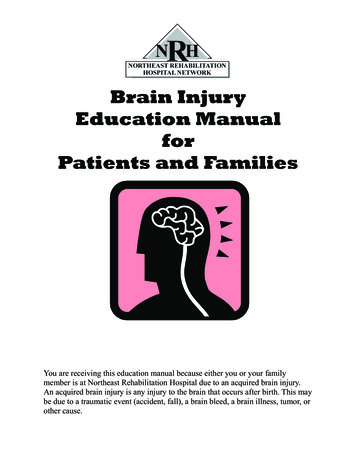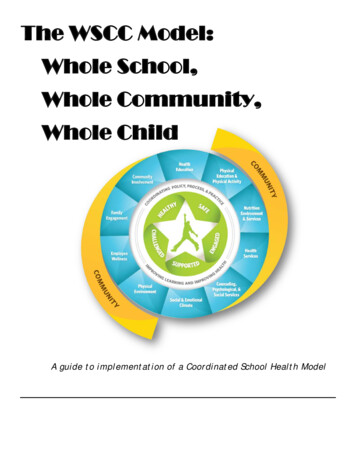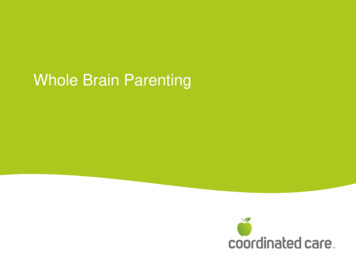
Transcription
Whole Brain Parenting
Objectives Understand basic brain functioning Explore the links between brain functioning andattachment Explore the role of reflective parenting to repairattachment Understand and improve left brain - right brain integration Learn strategies to help youth integrate thoughts, actionsand feelings and thereby operate from a whole brainperspective11/7/20182
Brain Definition: Organ of thought and feeling; thecontrolling center of the nervous system invertebrates, connected to the spinal cordand enclosed in the cranium (Webster) A process that regulates the flow of energyand information (Daniel Siegel, M.D.)11/7/20183
Brain Functioning 101
Brain Functioning 10111/7/20185
Flip the Lid (Hand Model of the Brain)
Hemispheres of the BrainLeftRight Loves and desires order Cares about the bigpicture, meaning andemotions– Logical– Linear– Literal– Linguistic11/7/2018– Emotional– Non verbal– Experiential7
Upper and Lower Brain Upper brain– Has the ability to process logic and cause and effectUses right and left side to develop personal insight Thebrain center for empathy and morality Lower brain– Instinctual– Fight, flight or freeze reactions– Operates more primal responses– Driven by strong emotions like fear and anger11/7/20188
Amygdala and Hippocampus Amygdala– Gateway to ours fears– Controls flight, fight or freeze responses– Buried near the tip of the temporal lobe– Name comes from its shape, Latin for almond Hippocampus– Responsible for encoding and organizing memories– Classifies and categorizes them so they may be usedat a later time11/7/20189
Attachment and the BrainAttachment patterns the personality andeffects the lifelong ability to haverelationships. Foundation for allrelationships and how we relate toothers!11/7/201810
Attachment and the BrainSecurely Attached– Attuned brain– Connected in a healthy way to others– Operates in a state of harmony and balance– Can regulate motor activities Physical, self, emotional regulation11/7/201811
Attachment and the BrainInsecurely Attached– Avoidant– Disconnected from others– Ambivalent/ anxious– Sense of confusion regarding relationships– Disorganized– Fearful of attachment figure11/7/201812
Mirror Neurons
Reflective ParentingA process of reflecting a child's internal world; interpretingtheir actions with an understanding of the underlyingthoughts, intentions, feeling in children's behavior: Helps children provide a voice to a subjectiveexperience, understand where things come from Helps to repair attachment issues Stay open, not judgemental!11/7/201814
Trauma and the Brain In early childhood, trauma can be associated withreduced size of the cortex which may impair complexfunctions like memory, thinking and language Trauma may effect “cross-talk” between the brain’shemispheres, including parts of the brain governingemotions11/7/201815
Trauma and the BrainIn school-age children, trauma undermines the developmentof brain regions that would normally help children:– Control fears, anxieties and aggression– Keep up attention for learning and problem solving– Control impulses– Manage stress11/7/201816
Trauma and the BrainIn adolescents, trauma can interfere with development of theprefrontal cortex, the region responsible for:– Consideration of the consequences of behavior– Realistic appraisal of danger and safety– Ability to govern behavior– Meeting longer-term goals11/7/201817
Calming the Mind and Brain Meditation is one way to calm the mind and brain Helps to quiet the animal brain and step out of afear response With practice, one can call up memories of ameditative state and instantly calm oneself What can be calming to a child?11/7/201818
“BELLY BREATHE” Sesame Street11/7/2018
“When we are no longer ableto change a situation - we arechallenged to changeourselves.”― Viktor E. Frankl11/7/201820
Strategies for IntegratingLeft Brain and Right Brain Right to left brain: Achieving a balance between the two Join the emotional storm in a calm and nurturing manner (Right side) Use touch language and eye contact to connect Tell your story child /young adult tell their story Put words to emotions help your child describe and label internalexperiences (Left side) Logically explain what is going on and redefine thesituation11/7/201821
Teach Your Child About Their Brain
Activities to Increase IntegrationLearn Something New– Learning a new language, painting, or adopting a newcraft Requires the coordination of multiple regions of the brain– Help your brain to make new connectionsNew neural pathways form new memories –” What firestogether wires together” – Dan Siegal11/7/201823
Activities to Increase Integration Talking/Listening Exercise– Having a conversation is one way to exercise yourbrain– Confuse your brain– Eat and brush your teeth with a different hand– Switch things up to present your brain with a completelynew set of stimuli11/7/201824
Cognitive Mindfulness Non- reactivity Observation Acting with insight Described feeling Nonjudgmental11/7/2018(Bear et al .2006)26
Memory Integration The Hippocampus, located in the medial temporallobe, helps us process memories and place andorganize Information (during sleep sometimes) Memories are first stored like puzzles pieces ofsensations. Feelings and impulses are thenorganized and stored by the brain to be used astime goes from implicit to explicit memory11/7/201827
Questions or Discussion?
References http://children.meditation.org.au/whois.asp http://reflectiveparenting.org/ Zen Brain Reflections: Reviewing Recent Developments in Meditation and States of Consciousnessby James H Austin M.D. The MIT press2006 The Mindful Brain: Refection's and Attunement in the Cultivation of Wellbeing. by Daniel Siegel(Norton Press) The Whole-Brain Child: 12 Revolutionary Strategies to Nurture Your Child’s Developing Mind,Survive Everyday Parenting Struggles, and Help Your Family Thrive: by Daniel J. Siegel, M.D. andTina Payne Bryson, Ph.D. (Delacorte Press 2011) Mindsight: The New Science of Personal Transformation by Daniel Siegel M.D.(Random House2010)11/7/201830
Thank You!
Whole Brain Parenting. 11/7/2018 Understand basic brain functioning Explore the links between brain functioning and attachment . Teach Your Child About Their Brain. 11/7/2018 Learn Something New -Learning a new language, painting, or adopting a new craft
